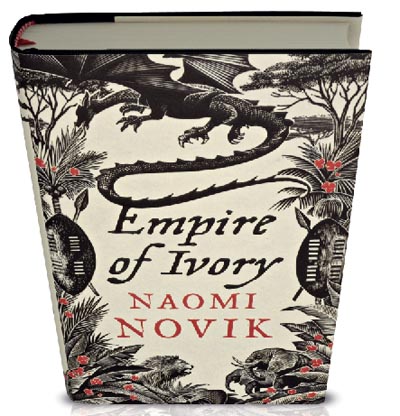Why you can trust 12DOVE
Author: Naomi Novik
Publisher: Voyager
394 pages • £14.99
ISBN: 978-0-00-725673-0
Rating:

God, but they were persistent. Almost two years ago, as Voyager pushed Naomi Novik, they didn’t want to take no for an answer. At a high-concept level you could very easily understand the publisher’s enthusiasm: Susanna Clarke meets Anne McCaffrey meets Hornblower – it’s got to sell, right?
And so it has proved. The adventures of Chinese dragon Temeraire and her stiff-upper-lipped officer companion Laurence have done the business. Whether they are much loved is another matter entirely. Somehow, there was something a
little too efficient about the first couple of volumes. Throne of Jade in particular felt a little flat, as if all of the surprises had been removed in the editing process.
Evidently, though, the lessons have been learned, or perhaps it’s simply that Novik is warming to her craft and becoming a better writer, because Empire of Ivory is an altogether different proposition. Why? Because it’s a novel that manages to combine elegant style with unexpected plot twists, pulling you along.
The story begins with Temeraire and Laurence arriving back from China to find that a flu-like epidemic is affecting Britain’s dragons. There may be a cure in Africa, so with Britain’s skies effectively unprotected from Napoleon’s forces, the duo is
sent south.
It’s classic 19th century adventure territory, but there’s one crucial difference: Novik immediately sets about undermining such stories. In particular, she has very little time for those who want to gloss over the fact of slavery. Britain, she makes abundantly clear, has much to be ashamed about in this regard. Even the hero of Trafalgar himself, Nelson, gets a good kicking from her for not opposing the people traffickers.
Nelson’s character is instructive for another reason. The great admiral’s fate in the Temeraire timeline is radically different to that of his real-world self. Elsewhere, the differences are even more marked. Crucially, the Africa of Novik’s novel is not a place that can be easily plundered by European – because dragons lurk in its interior.
To say too much more would be to enter spoiler territory, so we’re not going to go there. Instead, we’ll stand back and admire the way Novik’s alternate early 19th century is shaping up, opening up possibilities for future volumes.
There’s also much to admire in the way she draws her characters. If, in previous novels, Laurence was sometimes too much the honourable military man, he’s become a far more nuanced figure here, a man frequently caught between his sense of duty and the lack of honour he finds in others. There’s also a subtly-conveyed sense of a man learning new moral codes, allowing the feminist in Novik to have some fun at men’s attitudes to sex and marriage. As for Temeraire, he’s good company too, an adolescent learning about his world with wide-eyed awe and a proper sense of his own importance.
It’s all too easy to be cynical about the Temeraire novels and their high-concept pitch, but such cynicism ignores one crucial factor: Naomi Novik is shaping up to be a much more adept and ambitious writer than we might have expected. Empire of Ivory is an excellent book.
Jonathan Wright
SFX Magazine is the world's number one sci-fi, fantasy, and horror magazine published by Future PLC. Established in 1995, SFX Magazine prides itself on writing for its fans, welcoming geeks, collectors, and aficionados into its readership for over 25 years. Covering films, TV shows, books, comics, games, merch, and more, SFX Magazine is published every month. If you love it, chances are we do too and you'll find it in SFX.

